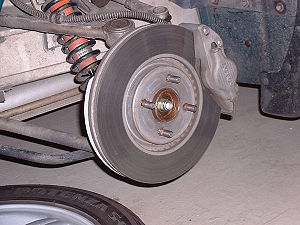Difference between revisions of "Brakes"
(→S1) |
|||
| Line 3: | Line 3: | ||
{{clr}} | {{clr}} | ||
==S1== | ==S1== | ||
| − | The first production of Elise S1's had [http://en.wikipedia.org/wiki/Metal_matrix_composite Metal Matrix Composite (MMC) discs as standard. This was an Aluminium-Ceramic composite which required specialist pads. | + | The first production of Elise S1's had [http://en.wikipedia.org/wiki/Metal_matrix_composite Metal Matrix Composite] (MMC) discs as standard. This was an Aluminium-Ceramic composite which required specialist pads. |
MMC brake discs look dull grey in colour and do not suffer from the normal red/brown rust that covers steel disks. | MMC brake discs look dull grey in colour and do not suffer from the normal red/brown rust that covers steel disks. | ||
Revision as of 15:51, 17 August 2006
The Brakes on the Elise utilises disc brakes all round. The system comprises of brake pads, brake discs and brake hoses. There are many better brake products on the market than the OEM fitment, and at a more resonable price.
S1
The first production of Elise S1's had Metal Matrix Composite (MMC) discs as standard. This was an Aluminium-Ceramic composite which required specialist pads.
MMC brake discs look dull grey in colour and do not suffer from the normal red/brown rust that covers steel disks.
If you have the older MMC discs you have not option but to buy the special MMC pads from your local dealer. Using pads designed for steel discs on MMC discs will destroy them in a very few miles, despite this fact some dealers will, somewhat unbelievably, allow you to spec steel based pads for MMC discs, make sure YOU know.
S2 Toyota
Introduced ABS
